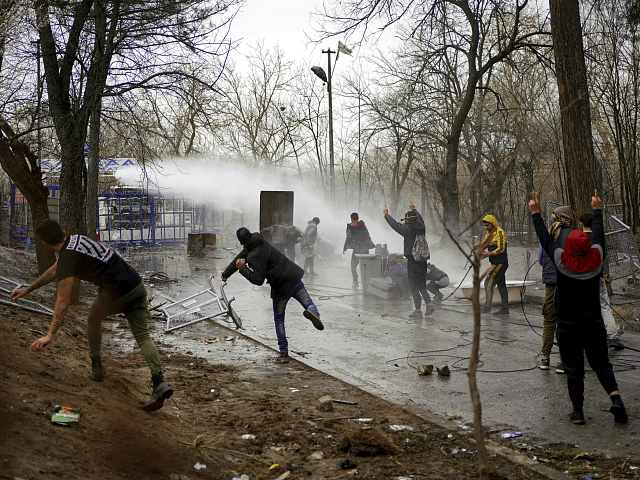Just four per cent of the supposed refugees who have breached the Greek border in recent days are Syrians, according to the Greek government.
Recep Tayyip Erdogan, the Islamist president of Turkey, claimed he was opening his borders to Europe in response to the threat of a fresh wave of refugees from Syria — despite the fact his reason for invading the north of the country was, ostensibly, to carve out a safe zone for Syrian refugees to be settled in.
However, the Greek government reports that only a small minority of the migrants who have breached their border defences since Erdogan “opened the gates” are Syrian — and even then many are said to be people long-established in Turkey, not new migrants fleeing the fighting between Turkey, its jihadist rebel clients, and the Russian- and Iranian-backed Syrian government.
The vast majority of the migrants detained in Greece, the government claims, are actually Afghans, comprising 64 per cent of the total.
Migrants from Pakistan account for almost a fifth of detainees, at 19 per cent, with migrants from Turkey itself in third place, at 5 per cent.
Syrians are said to be in a distant fourth place, at just four per cent, followed by Somali migrants at 2.6 per cent, with migrants from countries across Asia and Africa including Iraq, Iran, Ethiopia, Morocco, Bangladesh, and Egypt accounting collectively for 5.4 per cent.
The Turkish government disputes the Greek government’s numbers, however, suggesting that well over a hundred thousand migrants have reached Europe, and not only a few hundred as the Greeks suggest.
Erdogan’s decision to “open the gates” to Europe is widely regarded as a form of punishment for European governments’ lack of sufficient report, as he sees it, for the Turkish invasion of Syria, and was taken after a number of Turkish soldiers were killed in an airstrike mounted by either the Syrian government or its Russian allies.
Greek prime minister Kyriakos Mitsotakis has insisted that “Europe is not going to be blackmailed by Turkey” and that his government has “every right to protect our sovereign borders”, which is also part of the common external border of the European Union’s frontierless Schengen Area.
Officially, the European Union is backing Greece — although the rhetoric from some of the bloc’s more left-liberal members has not always been helpful, with the millennial feminist-led Finnish government having branded Greece’s decision to suspend asylum applications while the crisis is ongoing “wrong”.

COMMENTS
Please let us know if you're having issues with commenting.